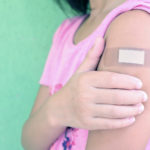COVID-19 vaccination in 12- to 18-year-olds: What does the science say?

With a third “booster” dose of the Pfizer/BioNTech vaccine now authorized for children age 12 and older, you may be wondering about the safety and effectiveness of COVID-19 vaccination in teens. With months of experience — and recent research — to draw from, we now have more answers.
Several recent studies led or co-led by Boston Children’s Hospital researchers find vaccination to be highly effective in preventing both COVID-19 hospitalizations and multisystem inflammatory syndrome in children (MIS-C), a rare but potentially serious illness that can follow coronavirus infection. Another study looked at myocarditis, a rare complication of vaccination, and offers reassurance that symptoms are usually mild and short-lived.
Myocarditis and COVID-19 vaccination in teens
Myocarditis is an inflammation of the heart muscle that can cause chest pain and other symptoms. It has been reported in some youth after COVID-19 vaccination. But research suggests that it is very rare — about one-hundredth of one percent in a recent study from Israel, for example.
Key takeaway
Myocarditis after COVID-19 vaccination is extremely rare. When it occurs, symptoms are generally mild and subside quickly.
And for teens and young adults who do develop myocarditis? A study co-led by Boston Children’s cardiologist Dr. Jane Newburger reviewed the charts of 139 young people aged 12 to 20 who had symptoms of myocarditis within 30 days of COVID-19 vaccination. Virtually everyone had chest pain, a third had fever, and about a quarter had shortness of breath. But these symptoms were usually mild and subsided quickly.
About 1 in 5 of the youth had weakened heart contractions, but this got better over time. Only seven of the 139 had serious heart arrhythmias. Patients spent an average of two days in the hospital, and 19 percent were admitted to an intensive care unit (ICU). The study appears in the journal Circulation.
“On average, this was not a very sick group,” Dr. Newburger says. “But because imaging showed inflammation or injury of the heart muscle in many patients, we urge continued heart monitoring. We also need more research to understand how this heart muscle injury occurs and what makes some youth susceptible.”
The risks of not being vaccinated
Meanwhile, the results of another study drive home the importance of vaccination for older tweens and teens. Led by Dr. Adrienne Randolph, a critical care physician at Boston Children’s, it looked at vaccination status in two groups of 12- to 18-year-olds: 445 who were hospitalized with COVID-19, and 777 who were hospitalized but didn’t have COVID-19.
Key takeaway
COVID-19 vaccination was 94% effective at preventing hospitalization and 98% effective at preventing the need for serious medical intervention.
The findings, reported in The New England Journal of Medicine, illustrate how serious COVID-19 can be. Overall, 40 percent of those hospitalized with COVID-19 were admitted to the ICU, 29 percent needed life support, and 2 percent died. More than 95 percent of those hospitalized and 99 percent of those needing life support had not been fully vaccinated. The team estimates that vaccination was 94 percent effective in preventing COVID-19 hospitalizations and 98 percent effective in preventing both ICU admissions and the need for life support.
Vaccines prevent multisystem inflammatory syndrome in children
A second study led by Dr. Randolph, published in the Morbidity and Mortality Weekly Report, shows that vaccination also likely protects against MIS-C. The study compared the vaccination status of 102 hospitalized children with MIS-C (ages 12 to 18) with that of 81 hospitalized children with neither COVID-19 nor MIS-C.
Key takeaway
The risk of MIS-C in unvaccinated children exposed to COVID-19 is likely higher and more severe than the risk of myocarditis from the vaccine.
Of the children with MIS-C, 95 percent were unvaccinated; of those who required life support, 100 percent were unvaccinated. The researchers calculated that two doses of the Pfizer-BioNTech vaccine were 91 percent effective in preventing MIS-C.
“Based on these findings, the risk of MIS-C in unvaccinated children exposed to the coronavirus is likely higher and more severe than the risk of getting myocarditis from the vaccine,” says Dr. Randolph. “Since vaccination also protects against acute COVID-19, the evidence strongly supports COVID-19 vaccination in people age 12 to 20.”
While the study didn’t include children 5 to 11 years old, these children are at the highest risk for MIS-C, Randolph notes. “That’s another reason for them to be vaccinated,” she says.
Explore COVID-19 research at Boston Children’s Hospital
Related Posts :
-

COVID vaccines are here for kids ages 5 to 11. Here’s what families should know.
On November 2, 2021, the U.S. Centers for Disease Control and Prevention (CDC) signed off on the use of the Pfizer-BioNTech ...
-

Answers to your questions about the COVID-19 vaccine
Update: On May 10, 2021, the U.S. Food and Drug Administration (FDA) granted emergency authorization for use of the Pfizer vaccine ...
-

MIS-C: The tip of an iceberg? Looking at cardiac care for this rare syndrome
In the early days of the COVID-19 outbreak, it seemed that children were far less likely to develop serious problems ...
-

Anxiety in kids during COVID-19: What parents should know
Some kids hide in their rooms. Others turn their cameras off during remote learning and don’t want to talk ...





